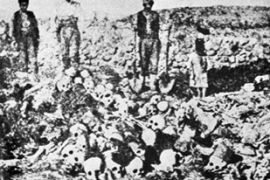Turkey condemns US ‘genocide’ vote
Ambassador recalled after US panel votes to call WWI killing of Armenians a “genocide”.

The vote, which enables the resolution to be sent to the full House for approval, came despite pressure from the White House and Turkey, a long-time Nato ally.
Hillary Clinton, the US secretary of state, told the chairman of the committee, Howard Berman, on Wednesday that “further congressional action could impede progress on normalisation of relations” between Turkey and Armenia, according to a spokesman.
But Berman, in his opening remarks at the committee’s hearing on Thursday, while calling Turkey a “vital and, in most respects, a loyal ally of the United States in a volatile region”, said “nothing justifies Turkey’s turning a blind eye to the reality of the Armenian genocide”.
‘Untimely’ vote
Suat Kinik-lioglu, a member of parliament from Turkey’s ruling Justice and Development party, told Al Jazeera that the vote was “very untimely”.
He said it was not for foreign legislators to judge on the “very complicated history of World War I”, especially “when this country is a strong ally, works closely with the United States and there is an ongoing reconciliation process between Turkey and Armenia”.
|
|
| Rob Reynolds reports on the “genocide” row |
“Turkey works very closely with the US on Iraq, Afghanistan, Pakistan, global terrorism, Middle East peace process, Syria-Israel talks,” he pointed out.
Saying he did not see the recalling of Turkey’s ambassador to the US as merely a symbolic gesture in a drama that would soon blow over, he said:
“This is being watched very carefully, there is high sensitivity towards this. Turks feel badly treated by only seeing one version of the events of 1915.
“I think the Americans would feel that same if we were to pass a resolution in our parliament talking about the treatment of [native] Indians in this country.”
Ankara said the outcome of the US panel’s vote demonstrated “a lack of strategic vision” among US legislators at a time when Turkey and the US “are working together on a broad common agenda”.
“We are seriously concerned that this bill… will harm Turkish-US relations and impede efforts aimed at normalising Turkish-Armenian ties,” it added.
Abdullah Gul, Turkey’s president, said the resolution had “no value in the eyes of the Turkish people” and warned that it would deal a blow on fledgling efforts to end decades of hostility between Turkey and Armenia.
“Turkey will not be responsible for the negative ramifications that this vote may have in every field,” he said.
White House spokesman Mike Hammer said Barack Obama, the US president, had spoken to Gul on the phone on Wednesday to express his appreciation for Turkey’s efforts to normalise ties with Armenia.
Turkey’s Hurriyet newspaper said Gul had urged his US counterpart to use his influence to block the resolution.
Obama had pledged to call the Armenian killings genocide during his election campaign in 2008.
The US president has said that while he has not changed his personal views, he does not want to upset promising talks between Turkey and Armenia on improving relations and opening their border which Turkey sealed in 1993 to protest against Armenia’s war with neighbouring Azerbaijan.
Complicating ties
Al Jazeera’s senior Washington correspondent, Rob Reynolds, said Thursday’s vote could complicate relations between the US and Turkey because Ankara is an important ally.
“First of all, it’s a highway through which the US supplies its troops in Iraq.
 |
| Armenian groups have long pushed US to call the 1915 killings as genocide [GALLO/GETTY] |
“For another, it’s been involved often as a broker for Middle East peace agreements and of course it’s a Nato ally and it has troops in the US-led Nato coalition in Afghanistan.”
Huseyin Bagci, a political analyst in Ankara, told Al Jazeera that the US decision would have implications on Turkey’s domestic and foreign policies.
“President Obama, if he’s going to speak the word genocide on April 24, then probably Turkish-American relations will go into a very difficult phase,” he said, referring to the date recognised by many Armenians across the world as Genocide Awareness Day.
“After this, the anti-American feelings in Turkey will increase, the Turkish nationalism will also get strengthened and the government is going to face certain reactions inside domestic politics.”
Ankara also recalled its envoy from Washington in 2007 when the same committee passed a similar genocide measure.
But George Bush, the then US president, stopped the resolution from going to the full House, wary that Ankara would block US access to a Turkish air base essential to operations in Iraq and Afghanistan.
Armenian groups in the US have for decades sought congressional affirmation of the 1915 killings as genocide.
Historians estimate that up to 1.5 million Armenians were killed under the Ottoman Empire, the predecessor of modern Turkey, around the time of the first world war.
Turkey denies that the deaths constituted genocide, saying 300,000-500,000 Armenians and at least as many Turks died in what was a civil war when Armenians rose up for independence and sided with invading Russian troops.
After decades of hostility, Turkey and Armenia signed a deal in October to establish diplomatic relations and open their border.
But the process has hit the rocks, with Ankara accusing Yerevan of trying to tweak the terms of the deal and Armenia charging that Turkey is not committed to ratifying the accord.